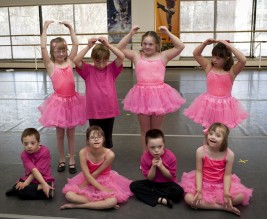
Colorado Ballet and the Anna and John J. Sie Center for Down Syndrome at the Children’s Hospital Launch Dare to Dance Class
First dance class tailored specifically for children with Down syndrome aims high
_______________________________________________________________________
DENVER—March 15, 2010— Sponsored by the Global Down Syndrome Foundation, the Dare to Dance class is based on Boston Ballet’s Adaptive Dance class and is the first collaboration between the Colorado Ballet and The Children’s Hospital.
The class will expose children with Down syndrome between the ages of 5-9 to movement and art of dance.
Colorado Ballet’s Education Programs Manager Becca Jacobson, Colorado Ballet Company Dancer Sally Turkel and Anna and John J. Sie Center world-renowned Down syndrome expert Patricia Winders will co-teach the 8-weeks class.
“We believe this class will not only increase our students physical awareness but provide self-confidence around learning and performance,” said Patricia Winders.
“The mission of Colorado Ballet’s Department of Education and Outreach is to make dance accessible to everybody and that is exactly what this class will do,” said Jacobson. “Our job is to give our students an opportunity to have fun through dancing and hopefully create a life-long love for dance.”
Dare to Dance class participants will meet every Monday from 4-5pm, April 5 through May 24 at The Children’s Hospital Wellness Center, located at 13123 E. 16th Ave in Aurora. The class will be preceded by a mandatory orientation class for parents and students on Monday, March 29th.
###
Recent Posts
- Singer Jordin Sparks Performs and Rep. Frankel and Rep. Hudson Honored at Global Down Syndrome Foundation’s May 9th AcceptAbility Gala in DC
- Global Down Syndrome Foundation is Proud to Support Cheeky Awareness Video “Assume That I Can” Taking the Internet by Storm
- Global Down Syndrome Foundation Launches Matching “21 for 21” Campaign for World Down Syndrome Day with Support from the Safeway Foundation
- Global Down Syndrome Foundation Applauds House Energy & Commerce Committee for Advancing Legislation to Authorize Down Syndrome Research Program at NIH
- Important NIH INCLUDE Legislation Aimed at Increasing Lifespan and Dramatically Improving Health Outcomes for People with Down Syndrome Introduced by GLOBAL Champion, Congresswoman Cathy McMorris Rodgers

 Experience our inspirational and groundbreaking videos and photos. Our children and self-advocates are beautiful AND brilliant!
Experience our inspirational and groundbreaking videos and photos. Our children and self-advocates are beautiful AND brilliant! Make sure your local Representatives are on the Congressional Down Syndrome Task Force.
Make sure your local Representatives are on the Congressional Down Syndrome Task Force.